 It’s Tuesday night at Unwind, a Los Angeles ladies night for professional lesbians run by Dawnita Moore. “I’m the type of person that, even when I’m going out, I’m looking for the next thing I’m going to do. So to combine personal with pleasure works well for me”, she says. She began the night in October, just as the stock market collapsed, and yet, so far, it’s been wildly successful. Unwind is just one of a new string of lesbian nights popping up around the country that focus on community and socializing over partying, and that use unique hooks (as well as cheap booze and food) to get the ladies in the door. There’s no silver bullet to nightlife success, but in a crushing economic pinch, these ladies nights may have just found the secret sauce to a recession-proof party.
It’s Tuesday night at Unwind, a Los Angeles ladies night for professional lesbians run by Dawnita Moore. “I’m the type of person that, even when I’m going out, I’m looking for the next thing I’m going to do. So to combine personal with pleasure works well for me”, she says. She began the night in October, just as the stock market collapsed, and yet, so far, it’s been wildly successful. Unwind is just one of a new string of lesbian nights popping up around the country that focus on community and socializing over partying, and that use unique hooks (as well as cheap booze and food) to get the ladies in the door. There’s no silver bullet to nightlife success, but in a crushing economic pinch, these ladies nights may have just found the secret sauce to a recession-proof party.
In San Francisco’s Castro, women’s nights are thriving. Last month, a new night called Womanizer opened at Bar on Church, causing the bar spokesperson Lord Martine to opine:
“Women in our community have had limited choices, until now, because no one was taking the initiative to produce something new and exciting for them,” said Martine about recognizing the desire and queer women’s “loyalty to venues and promoters that serve them well.”
“Our sisters deserve a myriad of nightlife options,” Martine said. “They’ve been waiting for something special … and venues, female DJs, and promoters are all too happy to respond.”
Luz Villa, another SF nightlife fixture, looks at the wide range of new Castro-centered nightlife, including nights called Rebel Girl, Les Ladies Night, Mango and a Latin-themed night at Pisco, and says, “I’m feeling inspired that queer women are starting new events. I think the more the better.”
 The new events are diverse, but share some commonalities. The first is a heavy emphasis on socializing over cruising. This isn’t to say that sex is out of the question, but camaraderie and networking take precedence. Moore explains the inspiration for Unwind wasn’t simply the desire to have another party, but to fulfill a need for connection in the community that she thought was missing:
The new events are diverse, but share some commonalities. The first is a heavy emphasis on socializing over cruising. This isn’t to say that sex is out of the question, but camaraderie and networking take precedence. Moore explains the inspiration for Unwind wasn’t simply the desire to have another party, but to fulfill a need for connection in the community that she thought was missing:
How about we take this to the next level?
Our newsletter is like a refreshing cocktail (or mocktail) of LGBTQ+ entertainment and pop culture, served up with a side of eye-candy.
I originally was going to try and partner with someone else – since I’m also an event planner – and help them piggyback on another night they were doing. I didn’t get a very quick response, so I decided to do it on my own. I thought it was something necessary. Everyone is always looking for something new – the next big wave – so I wanted to offer up the opportunity to have something new. It’s much easier for people to go to someplace straight from work than to go home. People like to socialize and go out and they also like to network and find new opportunities.
From that sense of community or need for it comes the second big trend you’re seeing in lesbian nightlife: a sense of community activism. In a lot of ways, this is a return to the original purpose of gay bars, which once served as political organizing hotspots as well as watering holes. Many of the new lesbian nights tap into a well of increased activism that’s emerged from last year’s protests, multiple marriage bills across the states and a new President in the White House.
In Philadelphia Tracy Buchholz and Corinne Thornton use their nightlife events, like the popular Scene, to raise money for and awareness about LGBT issues. Philly.com writes of the lesbian scene in the City of Brotherly Love:
“I’m going to resist the term elders but will say that the activist experience of many people I came out with was that we gave of our time,” says Gloria Casarez, director of LGBT affairs for Philadelphia. She joined Mayor Nutter’s administration in July after leading HIV/AIDS organizations and antipoverty initiatives since her teens.
She and her peers grew grassroots organizations, learning how to be donors with their money and dedication. “But these recent fund-raising efforts have been laced with fun and have the ability to raise very real dollars for very real use here in Philadelphia,” Casarez said.
“People are having fun; that’s key,” says Buchholz, 29. “I hope I’m helping raise awareness while contributing literally and figuratively to making our community come together and helping round out our nightlife, especially for the younger crowds.”
In L.A., Moore uses her night to raise money for local causes, as well. Next week’s event will raise money for the L.A. Gay & Lesbian Chamber of Commerce.
But it’s not all feel-good fuzzies that make the new lesbian night work. While socializing and politics are a draw, so are drink specials. Moore says that she’s seen a drop-off in nightlife overall, and to counter that at her own event, she’s ramped up the cheap goodies:
“I would say people are going out less. We’ve been offering amazing drink specials. We’re able to offer three or four dollar drinks for a three-hour happy hour, so that helps. As well as doing the same thing with appetizers, so we’re kind of giving people a break as well.”
The Bay Area Reporter sees similar tactics being employed by Castro bar owners:
“Hard economic times aren’t stopping women from partying, said bar and club owners and managers who have seen queer women pack their venues weekly. But several bars and clubs are taking the recession into account by adjusting prices and promoting special happy hours or drink and food menus to attract women to their parties, bar owners and club managers said.”
 Surprisingly, the other thing these nights have in common is an increased sense of diversity. Many of Philly’s lesbian nights, specifically cater to a mixed-crowd of gay men and gay women and even Karen Opp, owner of the Stray bar in Bernal Heights, SF, one of the cities few lesbian bars, welcomes the increase in diversity of women-centric nights,saying:
Surprisingly, the other thing these nights have in common is an increased sense of diversity. Many of Philly’s lesbian nights, specifically cater to a mixed-crowd of gay men and gay women and even Karen Opp, owner of the Stray bar in Bernal Heights, SF, one of the cities few lesbian bars, welcomes the increase in diversity of women-centric nights,saying:
“Enjoy these locations and support them. There’s nothing wrong with competition, it means that you have more opportunities and more options.”
For Moore, one of the core missions of Unwind is to get people out of their usual bubbles and to socialize with people of all ages and backgrounds. It’s this diversity that she attributes to her night’s success, saying:
I try to reach out to lots of different people who may not always find themselves wanting to be in a social situation. So, it kind of made it easier. I’m telling people that they can come alone or come with friends. Lesbians can be, like everyone else, at times a little bit cliquish, so it’s hard to infiltrate groups without knowing anyone, but it’s a smaller environment [here] and because you’re coming after work, you may not be coming with friends and there’s a greater opportunity to meet new people. I think that’s the whole point.
With the economy falling apart and everyone’s future looking uncertain, it’d be easy to imagine a nightlife scene which centered on hard-partying and mindless fun. Not to knock either of those erstwhile pursuits, but even if it’s just an after-work mixer, it’s heartening to see a new nightlife arise that celebrates and helps build community. In these cold times for the country, we’re rediscovering that cocktails can be about companionship as much as cruising and the value of a place where “everybody always knows your name.”

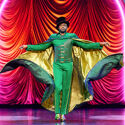

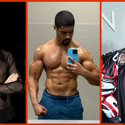
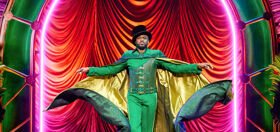






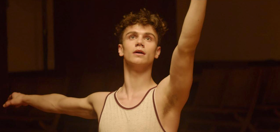
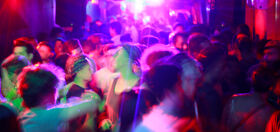
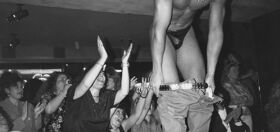


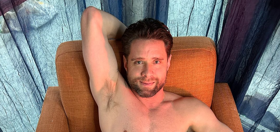
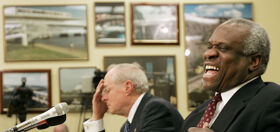
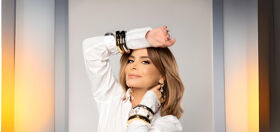
Sebbe
Thanks for bringing this to our attention and I am glad this is happening. In these times it all so important for us to stick to together and feel a sense of community. It would be nice if there was more interaction between us boys and our lesbian sisters (maybe um, earlier in the evening!).
Moore says that lesbians tend to be a little more “cliquish”, do you ladies (any out there) think that is true? I think it can sometimes be true with us men as well, for me and what I see, it often depends on what venue we are at. It also seems that the choices of venues is also greater for men, but that may be just because that’s what I am aware of more.
I’d love to hear some input from the ladies?
Powerbottom Philly
I love all the Philly posts this week – but to be honest, the SCENE party was held ONCE. I don’t think it will be savior of nightlife. Frankly, I thought it sucked. The FUSE party, which you do not mention, rocks though…And it’s been going on for a year without much fanfare. That’s a hot event.
Berry
This is interesting. Love the idea of people organizing the fab events they’d like to see. And makes me want to visit Philly!
judes
The lesbian nightlife has never “thrived” in the Castro. Yes, there is the new Les night at the Lookout, I didn’t hear anything about Womanizer opening (maybe I’m just out of the loop because I’m not 25), Rebel Girl is not in the Castro and Mango is in the Mission. I just don’t want out-of-town lesbians thinking that when they come to SF they should just head to the Castro. It’s still boy-ville.
petted
Nice article didn’t have get around to reading it earlier but I’m glad I did.
kara
Great article!! The party is still going for lesbians in South Florida. Karnival Beach Club is the newest venue for women who love women in South Florida. We are the lagest nightclub for women in the state and the only one located directly on Ft. Lauderdale Beach (also with a rooftop bar over looking the beach). We have adjusted our prices for the current economy by offering parties every weekend free of any cover charge and by also offering free drinks within certain hours. Make sure you all check us out whenever you are down south, we’d be happy to have you;) http://www.myspace.com/karnivalbeachclub
gay4pay
great article!
about the philly lady nightlife…the article didn’t mention that event-thrower tracy b has thrown queer parties for years. the “scene” got so much fan-fare because of the past popularity of her events.
the past two parties have been packed. if any lady wants to check out philly nightlife, i highly recommend the scene party!!!
Corinne
Philly has many secret ways and lots of cool events here! Come visit! There are actually tons of monthly events that happen in Philly not just FUSE or the Scene…The Next Big Thing, Common Ground, Free Cupcakes, In Stereo, Modern Love, 3 Dollar Bill to name a few! It takes a lot of work and time to pull together an event every month and it’s inspiring to see it happening all over the US.
Go on, girls!
sonya
so dirty two of both…hueeeekzzzzzz…like a doggie…hahahahahahah
ingin mempunyai keluarga yang sakinah mawaddah warrohmah….apa lagi yg kurang dari diriku..smuanya sudah aku dapatkan..knp sampai hari ini aku belum bertemu dgn pasangan yg cocok&memahamiku?ssst…anda jgn berputus asa dahulu kawan..kami bs membantu permasalhan anda disini…cb saja gabung di club jodoh kmi…yg namanya jodoh bs ketemu dimana saja..klo anda tertarik..daftar dl man..ketik REG JODOH#P(bagi yg register pria&ket ini tdk diikutsertakan) atau REG JODOH#W(bagi yg register wanita&ket ini tdk diikutsertakan) kirim ke 9789(khusus Telkomsel)..cobalah…&jgn berputus asa dahulu..
mona
jangan lewatkan wallpaper2 cantik&ringtone2 ter-update yg skrg lagi hitz lewat gt ajah dari hp kamu..mo ga kmu dapetinnya?caranya gampang banget ketik REG MAIN kirim ke 9789(khusus pengguna TELKOMSEL),gampang banget caranya,gak ribet & keren2 lagi wallpaper,ringtone,truetones&msh banyak lagi yg deee..yg bs kmu pilih……ga bakalan nyesel deeee…
mona
anda ingin mendapatkan wallpaper lucu-lucu&unik2…ringtone2 ter-update langsung dari HP kmu…gampang banget….kamu tinggal ketik REG MAIN kirim ke 9789(khusus pengguna Telkomsel)…buruan guys…beda dech sm yg lain…penuh styles…
mona
hobi banget otak atik dunia maya or cari tau update software terbaru…..gampang bgt…kamu2 bs masuk ko ke layana nge-net kita looooh…d jamin dweeh..update trs ko info2 na…mo ifo game,software,music,movie2s yg masuk box office….smua ada di sini dweeeeh….caranya gampang banget kamu bisa ketik REG NET kirim ajah langsung ke 9789(khusus pengguna telkomsel)ga bakalan ketinggalan info de….n kmu2 d jamin ga tkt d blg gaptek lage….ayo gabung aza di sini&dapatkan smua trik2 dunia nge-net…
mimun
numpang lagii yaaaah..^^
”jatuh bangun aku mengejarmu….namun kmu ttep memilih dia…”anda patah hati seperti lirik lagu tersebut?….buang jauh2 pikiran mengejar2 pasangan kita tp dia tdk mau memilih kita?dan blm tentu dia itu cinta sejati kita…hidup ni berjalan trs guys…klo anda bosan sendiri…cb gabung d club jodoh kami…siapa tau anda temukan cinta sejati anda di sini…mau ikut?segera ketik REG JODOH#P(untuk pria) , REG JODOH#W(untuk wanita) kirim ke 9789(khusus pengguna telkomsel)&jgn prnh ragu untuk mencoba karena kesempatan tidak datang dua kali…